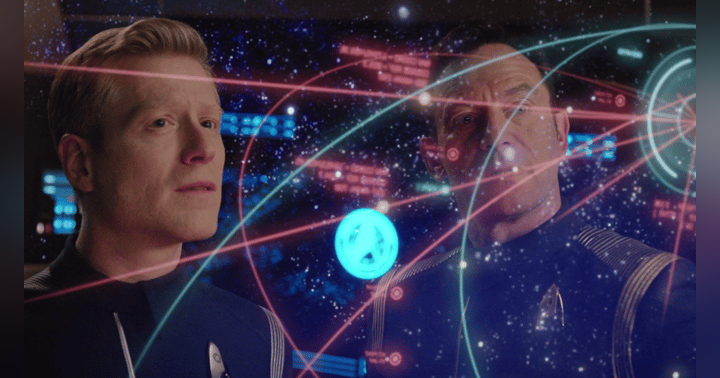Trust: The Key to Effective Leadership

Welcome, everyone! Thank you, once again, for climbing aboard this wild ship with me. Today is a good one! (I feel like I always say that, but what can I do? It’s always true.) Today we learn some leadership lessons from an unexpected source. See what I mean as we dive into the 14th episode of the 6th season of The Next Generation - Face of the Enemy.
Ok. So. Trust. I think we can all agree it’s a vital element in any relationship. All relationships work, in life and in leadership, because of trust. And when trust is lacking, everything falls apart. Today we’ll learn about trust from the relationship between a Romulan commander and her crew. Commander Toreth is clear - her primary duty is to protect her crew. She knows it, she believes it, and she lives it. Throughout the episode, she stands up for them, demonstrating that she is willing to put herself at risk, both professionally and personally, for their sake. Her actions definitely back up her words. She is someone who leads by example, evoking trust from her crew, something she will be able to rely on in the future. She is also courageous. She would never ask someone to do something she wasn’t also willing to do herself. She’s been there, gotten through it, bought the t-shirt, and now is leading her people through it. I like to say, “you can’t lead someone where you’re unwilling to go,” and Toreth is a perfect embodiment of this idea.
While Toreth is a great example of leadership, what I don’t want you to hear is that you, as a leader, have to be able to do all of the jobs of the people that report to you. You are the leader; THAT is your job. Let them do theirs. The point here isn’t that Toreth, or you, have done everything your team has done or will do. The point is she is willing, and you should also be willing, to be there with them. Don’t leave your team on their own. Instead, be a leader that stands with and supports their team as you do the hard things that are part of your job.
When we lead like Toreth, our people feel it. It creates a culture of trust that can have an incredibly positive trickle-down effect. I would venture to say that trust may be THE key to effective leadership. When you lead with trust, it does incredible things for you and your team. Trust allows your staff to demonstrate their full potential. Isn’t that exactly what we want? We want people to perform at their best! Trust is what makes this possible. If your team trusts you, they will listen to what you have to say. They will be loyal. When you have to deliver bad news, they will listen and, more likely than not, receive it well or as well as they can. And when you’re in trouble, they will stand by your side. In a pivotal moment during this episode, Toreth’s crew was forced to switch their allegiance to Rakal. They did so out of fear and force. Fear can be a powerful motivator, but it never lasts, and it does not create loyalty. We know this because at the first possible opportunity, the crew abandoned Rakal and came to Toreth’s aid! Trust leads to a team that shows up when it matters. Lack of trust leads to non-sustainable leadership.
We also get to see some great examples of how trust is formed from Captain Picard. He is faced with the challenge of DeSeve - a defector, or traitor, who has returned. Picard has every reason to reject him and be on guard. But instead, Picard opens the door to possibility by listening. He remains calm, asks questions, and reserves judgment. Even when DeSeve is caught being less than open, Picard chooses not to retaliate immaturely. He doesn’t make it about him and what he’s feeling, but about what’s truly important - the information being shared. Picard has a mission in mind, and that is what’s leading him. His ability to be non-reactive and dedicated to the greater goal allows DeSeve to see him as trustworthy. In turn, DeSeve owns his mistake and explains why. He is honest and vulnerable. The foundation of trust that is built can grow.
DeSeve’s message is about Spock, and again, trust comes into play! Picard trusts Spock, so he extends a sliver of that trust to DeSeve. Picard approaches DeSeve with emotional intelligence, listening and asking clarifying questions without a loaded agenda. Because of this wise method, he not only gets the information he needs but also allows DeSeve to share some of his trauma from his time with the Romulans, possibly making him a more valuable asset to the Federation. The opportunity to be known creates connection and builds trust. In a 4-minute scene, Picard puts on a masterclass on getting information and strengthening trust!
We use this same form of trust-building all the time. Think about your LinkedIn profile. When someone requests a connection with you, you’re more likely to accept if you have a second-degree connection, or at least more likely to engage with them once you’re connected because of your shared connection. As human beings, we are often introducing two people because of our shared relationships with them. “Hey Sarah, this is Isaiah. Isaiah is new to the company but really delivered on a recent project. Isaiah, Sarah is probably one of the best project managers we have. I thought the two of you could really benefit from each other.” Leveraging a shared relationship establishes a baseline for trust to form. You have to continue to build on that trust, of course. But a shared relationship is a great place to start.
Not only is the power of trust being explored on these separate ships, but also between the ships. Troi is trying to connect to the Enterprise. She’s been undercover as a Romulan and wants to complete her mission and get back to her ship. Because she has had extended time and experience with the Enterprise and its crew, she has developed a deep trust that allows her to know and believe they are capable of finding her. She sends out a minor imbalance in the warp core emissions, barely perceptible, but something she is confident her friends on the Enterprise will find. Trust takes time and shared experiences. It can be coaxed along and intentionally supported - but not rushed.
One of the most remarkable examples of trust in this whole episode, though, was entirely unspoken. The Khazara hails the Enterprise. Immediately, both Picard and Troi trust the other. They play their parts successfully. If they didn’t have bulletproof trust, Picard likely would have faltered or asked the wrong question. Instead, he trusted she knew what she was doing, and she trusted Picard and the crew would do their absolute best to help. At the end of the day, trust is what avoided an intergalactic war in this episode and moved some key players through complex and dangerous situations. If trust can do that for space travelers, just think of what an impact it can make in your leadership and among your team!
What thoughts do you have on trust? Where have you had success because of it? Where have you noticed a lack? Let me know! I’m on all the socials @jefftakin If you have enjoyed the Starfleet Leadership Academy, please share it with a friend or someone you think could benefit from it.
This post contains affiliate links. I may receive a commission for purchases made through these links but it won't cost you any more.


